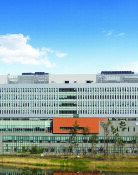`Don`t Cry for Me, Sudan`
"The heat wave was deadly. It was 55 degrees Celsius. I didnt realize thermometers had more than 50-degree markings until the priest showed me. I felt like my clothes were burning. The river in Tonj was a muddy puddle. Children splashed in the water, and instead of dabbling in it, they gulped up the water.
This excerpt is from a memo written by Lee Jae-hyeon, climate and air quality policy director of the Environment Ministry, after visiting the small Sudanese village of Tonj when while working for the U.N. Environment Program. He was a sponsor for the late Catholic priest Lee Tae-seok, nicknamed the "Albert Schweitzer of Sudan," who starred in the famous Korean documentary movie, "Don`t Cry for Me, Sudan."
In 1956, 11 years after the end of World War II, Sudan became an independent country in breaking away from two centuries of British and Egyptian rule. A new tragedy was waiting to happen, however. The Muslim-majority north denounced and impoverished the south, where most of the population was Christian. The south had no roads or buildings and this caused a rebellion in the south that lasted for 10 years until 1978, when southern Sudan finally seemed to move closer to independence.
A week before the signing of the peace deal, oil was discovered in southern Sudan and this reversed the situation. The north nullified its promise to give the south autonomy, passing an Islamic law to nullify the independence of the south and convert southerners to Islam. Southern Sudanese resisted by assigning one man from every family to the military. As the largest country in Africa in size and rich in resources, Sudan eventually declined to one of the poorest countries on the continent.
After decades of fighting for independence from the north, southern Sudan seceded on July 9 this year and became the Republic of South Sudan. The country became the 193rd member of the United Nations. The Korean government has sent peacekeeping troops and police to South Sudan to help rebuild the nation. Korea has sent peacekeeping troops to eight countries, including Haiti and Lebanon. Having been a colony of Western nations, South Sudan has high expectations of Korea, which has had a similar experience and achieved high economic growth over the past decades. Korean troops hope the people of Tonj regain their smiles so that Korea can contribute to the global community.
Editorial Writer Chung Sung-hee (shchung@donga.com)





![[단독]年수출 처음 일본 제쳤다…韓 1041조원 vs 日 1021조원](https://dimg.donga.com/c/138/175/90/1/wps/NEWS/IMAGE/2026/01/22/133214781.1.jpg)

